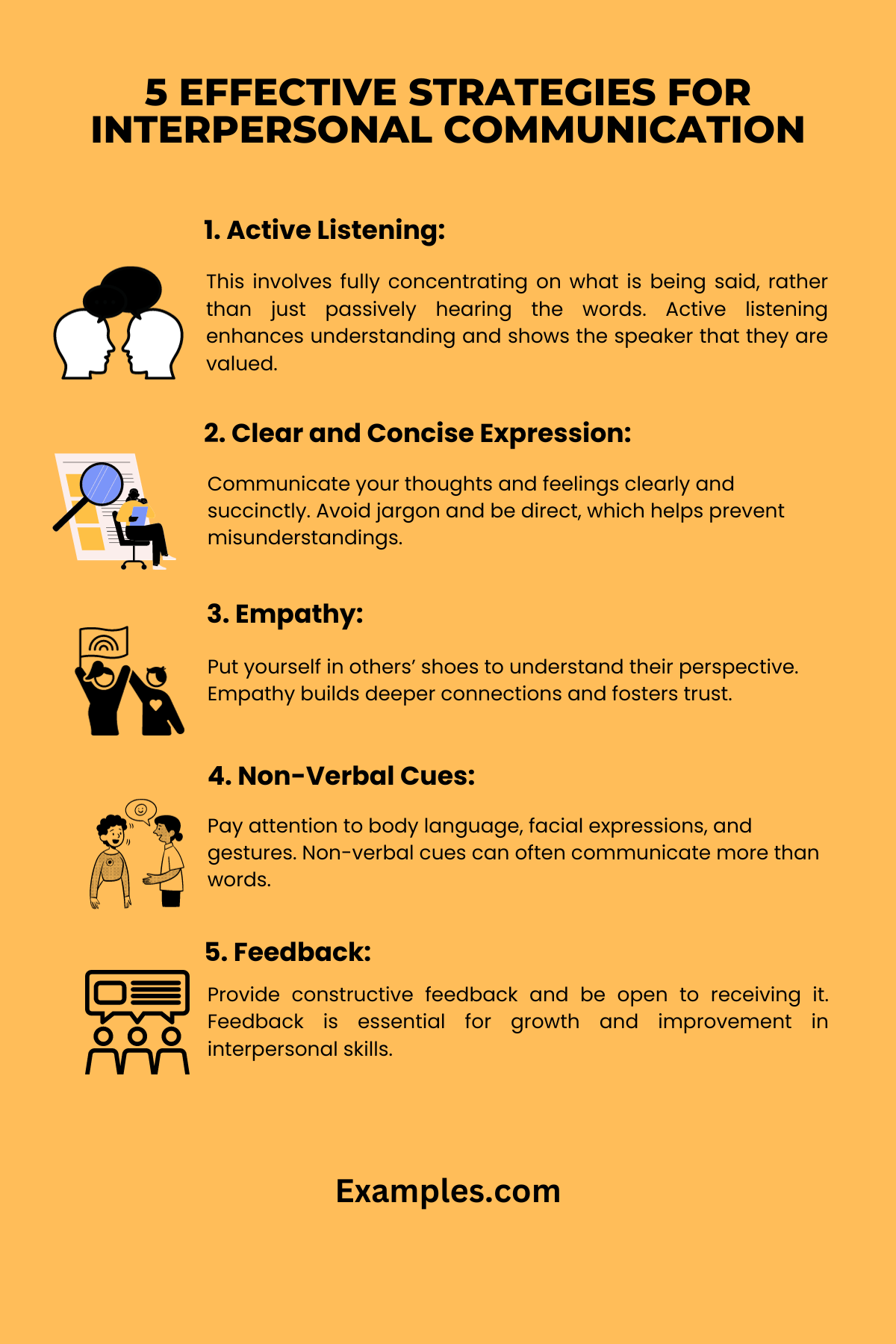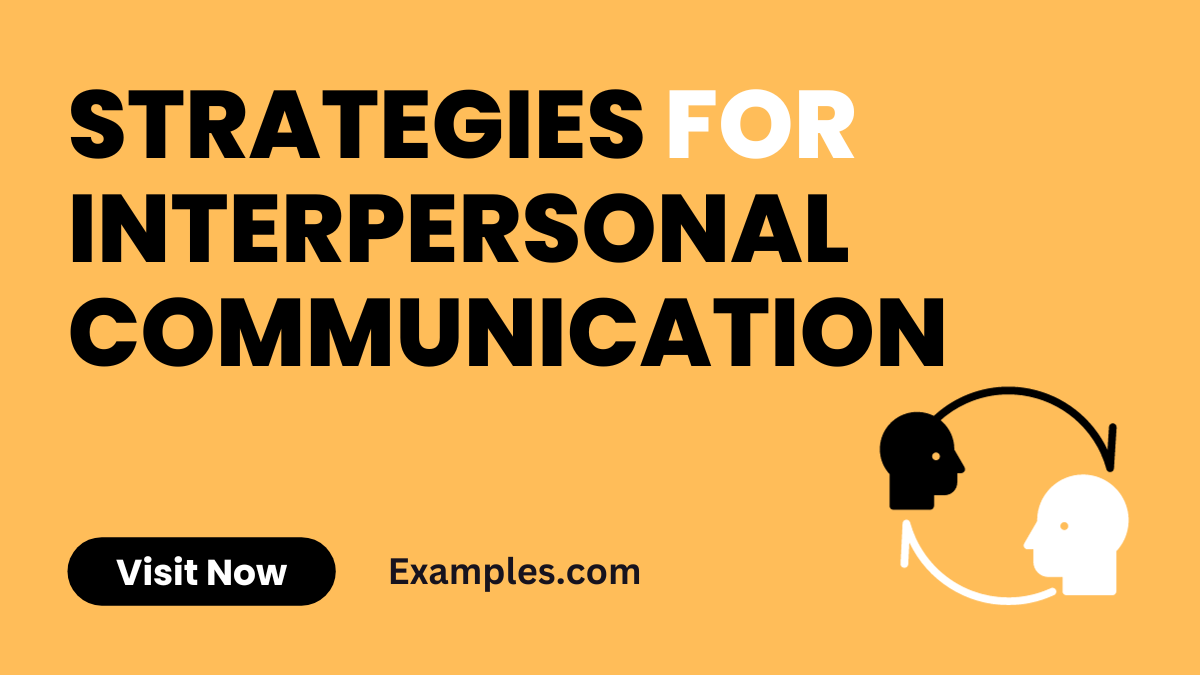10 Strategies for Interpersonal Communication Examples
Unlock the potential of effective interaction with our comprehensive guide on Strategies for Interpersonal Communication. This resource delves into various techniques, enriched with practical interpersonal communication examples, to enhance your ability to connect and engage with others. From mastering verbal nuances to understanding non-verbal cues, our guide provides valuable insights and actionable strategies, equipping you with the skills needed for successful and meaningful communication in every aspect of life.
What are the Strategies of Interpersonal Communication? – Definition
Strategies of interpersonal communication are the techniques and methods used to effectively share information and build connections with others. These strategies encompass skills such as active listening and clear verbal communication, and also include understanding non-verbal cues and demonstrating empathy. The goal is to improve the quality of interactions, making them more meaningful and effective. By applying these strategies in various settings, from personal conversations to professional environments, individuals can enhance their ability to communicate, fostering stronger and more productive relationships.
5 Effective Strategies for Interpersonal Communication

Enhancing interpersonal communication is crucial for success in both personal and professional spheres. In this section, we discuss five key strategies that are fundamental in fostering effective communication. Each strategy is integral for improving interpersonal communication skills, ensuring clearer understanding, and building stronger relationships. Mastering these strategies can significantly enhance your ability to connect and communicate effectively in various settings, including interpersonal communication in the workplace and personal life.
- Active Listening: This vital strategy involves fully engaging with the speaker, a key component of listening in interpersonal communication. It includes paying attention not only to the words but also to the tone and body language, reflecting an understanding of the speaker’s message. Active listening improves mutual understanding and is a cornerstone of effective communication.
- Clear and Concise Expression: The ability to express thoughts and emotions clearly is a crucial aspect of verbal communication in interpersonal communication. This strategy involves using straightforward language and being concise, which helps prevent misunderstandings and ensures that the message is understood as intended.
- Empathy: Empathy, a significant element in emotional expression in interpersonal communication, means understanding and sharing the feelings of another. This strategy builds trust and strengthens relationships, making it a key element in effective interpersonal communication.
- Non-Verbal Cues: Understanding and effectively using non-verbal cues, such as body language and facial expressions, is essential in non-verbal communication in interpersonal communication. These cues often convey more than words and are crucial in fully understanding the message being communicated.
- Feedback: Providing and receiving constructive feedback is a vital strategy for growth in interpersonal communication skills. This involves offering feedback in a thoughtful manner and being open to receiving feedback from others, allowing for continuous improvement in communication styles.
Different Strategies for Interpersonal Communication

Interpersonal communication varies across different contexts and relationships, making adaptability a key factor. This section explores various strategies tailored to specific situations, emphasizing the importance of understanding and flexibility in communication. Employing different strategies as needed can lead to more effective interactions in diverse environments, including interpersonal communication in business and social settings.
- Adaptability: Adapting your communication style to suit different situations and people is a valuable strategy in interpersonal communication. This involves being flexible and responsive, enhancing the effectiveness of your interactions.
- Conflict Resolution: Managing disagreements constructively is a crucial strategy in interpersonal conflict communication. Effective conflict resolution involves maintaining respect and understanding, essential for preserving positive relationships.
- Cultural Sensitivity: Understanding and respecting cultural differences in communication styles is vital in today’s globalized society. This strategy is crucial in culture interpersonal communication, involving being aware of and adapting to various cultural norms and communication styles.
Strategies for Improving Interpersonal Communication

Improving interpersonal communication is a journey of continuous learning and application. This section provides strategies for enhancing communication skills, focusing on self-improvement and practical use. These strategies are essential for refining the ability to communicate effectively in various scenarios, from personal conversations to professional engagements in areas such as interpersonal communication in healthcare and educational settings.
- Continuous Learning: Staying informed about the latest communication techniques and theories is vital. This involves seeking new knowledge through resources like interpersonal communication books and seminars, providing fresh insights into effective communication.
- Self-Assessment and Reflection: Regularly evaluating your communication style and its impact is key. Reflecting on your interactions helps identify strengths and areas for improvement, crucial for developing interpersonal communication skills.
- Practice: Communication improves with practice. This strategy encourages applying your skills in different scenarios, from casual conversations to professional environments, making effective communication a natural part of your repertoire.
By integrating these strategies into your daily life, you can greatly improve your interpersonal communication. This comprehensive guide, optimized for “Strategies for Interpersonal Communication,” equips you with the tools to enhance your interactions, leading to more fulfilling and productive relationships.
As we wrap up our exploration of strategies for interpersonal communication, it’s clear that mastering these skills is key to building stronger, more effective relationships. From active listening to adapting to various communication styles, each strategy plays a crucial role in enhancing our interactions. To further enrich your understanding, the University of Minnesota provides comprehensive insights into interpersonal communication processes, offering valuable perspectives for both personal and professional growth.
In summary, the “Strategies for Interpersonal Communication” guide offers invaluable tips and techniques for enhancing communication skills. By embracing strategies like active listening, empathy, and adaptability, you can significantly improve your interactions. Whether it’s in personal relationships or professional settings, these strategies are key to effective and meaningful communication, paving the way for stronger connections and successful interactions.



